19 Mar 2014 | China, Digital Freedom

WeChat was the darling of the Chinese start-up scene, the sexy competitor to Weibo domestically, and Twitter and WhatsApp, on the global stage. The design of the website meant that freedom of speech was for a while preserved – mainly because messages between users remained relatively private and insulated from the wider internet. But Beijing has orchestrated a sudden clampdown on the service : closing several high-profile accounts, some with hundreds of thousands of followers.
When users access the banned accounts, a Chinese message appears, translated as:
Due to reports from users that have been confirmed, all functions for this public account have been shut down for violating regulations. We suggest you cancel your subscription.
Users operating the site in English received a slightly different message – notably without any mention of “We suggest you cancel the subscription.”
WeChat started as a messaging service – however in 2012 the company behind the app – Tencent, introduced public accounts so that subscribers could follow celebrities, brands and well-known journalists and media outlets.
All of these subscription-based accounts on WeChat come with a “report” button at the bottom right of the content page. Some accounts had hundreds of thousands of subscribers.
Tencent has not stated its reasons for shutting down the accounts. The Chinese authorities have previously warned users that “spreading rumours” online is a crime – “spreading rumours” being a euphemism for speculation about corruption amongst senior Chinese officials.
Users of WeChat had already reported that the app blocked certain sensitive words.
Analysts have said they are not surprised by the censorship – although admit that WeChat has survived longer than most websites in China without restrictions on freedom of speech.
“I don’t find the suspensions surprising, though it’s still disheartening,” Jason Ng, author of Blocked on Weibo and social media expert.
“It would’ve been foolish of authorities not to regulate WeChat, like they do all other social media when they clearly have the capability and the will to do so.” Ng added “The only thing holding them back perhaps was a lack of resources.”
Ng pointed to the original “insular nature” of WeChat messaging, meanig it was less likely for “rumours” to go viral. However since 2012, the introduction of “new public accounts had clearly changed the authorities assumptions [about WeChat]”.
Yunchao Wen, a freedom of speech activist and Chinese social media expert told Index
“The Chinese government have never leaves any permanent space for political expression – sometimes they don’t find them straight away, sometimes they’re too busy dealing with other issues, but they are always censored.”
Wen also stressed that more than two hundred people were jailed by the Chinese authorities over political or human rights issues in 2013, as well as suggesting that the news had been “buried” while journalists were distracted.
“They closed down the Wechat public accounts on the last day of 12th National People’s Congress, trying to make sure foreign journalists didn’t notice,” said Wen.
Speculating on whether the censorship campaign will have hit WeChat commercially, Ng was sceptical.
“I don’t think it’s hit them too hard; it was only 50 or so accounts.” Ng also quipped “One Lionel Messi commercial and this event will probably be forgotten,” referring to the high profile celebrites who are regularly featured on the site.
WeChat was launched in early 2011, reportedly attracting 100 million registered users in its first fifteen months. The company revealed that it had 270 million active monthly users, up 124% from the previous year.
Sina Weibo, a key competitor for WeChat, is gearing up for an IPO on the Nasdaq – targeted to raise $500m. However investors have been warned that China’s censorship policies may negatively affect business – with several paragraphs in their sales materials relating to censorship.
Sina Weibo faced similar censorship to WeChat in 2012, telling investors “we had to disable the comment feature on our platform for three days to clean up feeds related to certain rumors.” Users were speculating about a possible coup d’etat in Beijing.
This article was published on 19 March 2014 at indexoncensorship.org
19 Mar 2014 | China, News

Hong Kong journalists are anxious at present – with good reason. On the morning of 26 February Kevin Lau, former chief editor of Hong Kong daily newspaper Ming Pao, was attacked as he got out of his car. Suffering stab wounds to his back and legs, Lau was rushed to hospital where he underwent emergency surgery.
Nine men have since been arrested over the attack, with police saying some are linked to organised crime. But many media workers believe differently, namely that the stabbing was provoked by Lau’s record of pushing journalistic boundaries at Ming Pao, and that it’s a message for local journalists to beware criticising Beijing.
Once a British colony, Hong Kong reverted to Chinese rule in 1997. Under the policy of “One Country, Two Systems”, Hong Kong was granted a degree of autonomy, with press freedom protected under the Basic Law.
The law isn’t a total farce. To this day, the city’s newsstands display a varied, vibrant collection of papers. In Reporters Without Borders’ World Press Freedom Index 2013 Hong Kong was ranked 58 globally, just one slot below Italy and far above China at 173.
However, beneath the surface a different story emerges. Over the past year, half a dozen violent attacks on people in media who are critical of the Hong Kong and Chinese governments have been reported, as have abrupt dismissals and resignations of several outspoken journalists.
Meanwhile, self-censorship is growing.
“It’s a creeping, insidious type of thing. If you want to keep your job, you tow the line. I work with guys who are pro press freedom, but they are still censoring constantly,” said a journalist who only agreed to talk on condition of anonymity. The man, who is a reporter at a prominent local newspaper and has been living in Hong Kong for three decades, explained how self-censorship started to emerge in the mid-90s and has become rife in recent years.
Then there are the “gatekeepers”, as he refers to them – journalists who have been educated in the Chinese school of journalism (“never question authority”) and are encouraged to run stories according to a Beijing agenda. They now get their information from Chinese media sources such as Xinhua and China Daily, as opposed to the past practice of using Reuters, AP and other international news wires.
Why has this situation emerged? Money’s a big factor. Media owners in Hong Kong used to be either local business tycoons or people in media themselves. Now they’re predominantly international businessmen with links to China, who are reliant on Chinese currency to stay afloat. According to the Committee to Protect Journalists, over 50% of Hong Kong’s media owners are closely connected to the Chinese government. Other media owners, such as the Malaysian billionaire Robert Kuok from the South China Morning Post and Malaysian Tiong Hiew-king of Ming Pao, have strong commercial interests in China.
One exception to the rule is Next Media, a profitable company that owns Apple Daily, one of Hong Kong’s most widely read newspapers – and the most openly critical of China. Next Media has survived the onslaught. But certain advertisers have withdrawn sponsorship, acting as a deterrent for smaller, less profitable papers.
Gregory Lee, an academic and writer who lived in Hong Kong on both sides of the handover, says the academic press is under attack too. The days of people publishing in Hong Kong because they couldn’t in China have ended. Lee knows of one academic who criticised China’s former leader Hu Jintao and had his entire book pulled.
Lee currently teaches Chinese studies at the University of Lyon, France. Even thousands of miles from Beijing, the Communist government’s touch is still felt.
“I’ve got Hong Kong students here who are desperate about the encroachment of mainland China on Hong Kong culture. What’s interesting is that these students were very young when the handover happened, but they still see their identity as Hong Kong.”
One thing’s for sure, Hong Kong residents will not be easily silenced. In the wake of Lau’s attack, thousands took to the streets to voice support for press freedom and to denounce the violence, and this protest was just a warm-up. Occupy Central, which is set to take place in July, should see plenty more out in public demanding rights to freedom of expression.
“Hong Kong has a golden opportunity to be a watchdog for what’s happening in the mainland, due to its proximity and links to China, and yet the press are failing in their duties,” says prominent blogger and activist Tom Grundy, who plans to attend Occupy Central. Grundy believes the protest will be “a defining moment for Hong Kong autonomy” as the government is presented with different ways to respond.
Attending Occupy Central is not just about protecting Hong Kong’s present – it’s about the future too.
“There’s a concern that when 2047 comes, Hong Kong will be absorbed by the mainland,” Grundy says of the “One Country, Two systems” agreement that will expire then.
Back in the hospital, Lau’s recovery is underway. The nerves in his legs are healing and doctors are confident he will walk again. The future of Hong Kong’s free press, on the other hand, remains in the balance.
This article was posted on 19 March 2014 at indexoncensorship.org
8 Mar 2014 | Azerbaijan News, News
International Women’s Day is a day to remember violence against women, the education gap, the wage gap, online harassment, everyday sexism, the intersection between sexism and other -isms, and a whole host of other issues to make us realise we’ve still got a long way to go. A day to demand continued progress, and a day to pledge to work to achieve it.
But it is also a day to celebrate. To appreciate the fantastic achievements that are made every day, everywhere, by women from all walks of life. It’s a day to be grateful to the women who dedicate their lives to fighting on the front lines to protect rights vital to us all. We want to shine the spotlight on women who have stood up for freedom of expression when it’s not the easy or popular thing to do, against fierce opposition and often at great personal risk. The following eight women have done just that. We know there are many, many more. Tell us about your female free speech hero in the comments or tweet us @IndexCensorship.
Meltem Arikan — Turkey
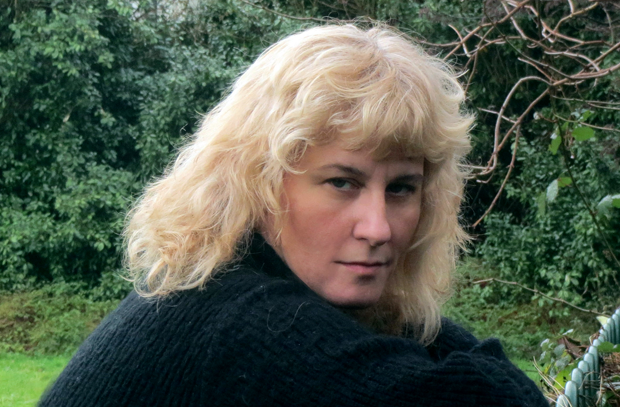
Meltem Arikan
Arikan is a writer who has long used her work to challenge patriarchal structures in society. He latest play “Mi Minor” was staged in Istanbul from December 2012 to April 2013, and told the story of a pianist who used social media to challenge the regime. Only a few months after, the Gezi Park protests broke out in Turkey. What started as an environmental demonstration quickly turned into a platform for the public to express their general dissatisfaction with the authorities — and social media played a huge role. Arikan was one of many to join in the Gezi Park movement, and has written a powerful personal account of her experiences. But a prominent name in Turkey, she was accused of being an organiser behind the protests, and faced a torrent of online abuse from government supporters. She was forced to flee, now living in exile in the UK.
I realised that we were surrounded, imprisoned in our own home and prevented from expressing ourselves freely.
Anabel Hernández — Mexico

Anabel Hernández (Image: YouTube)
Hernández is a Mexican journalist known for her investigative reporting on the links between the country’s notorious drug cartels, government officials and the police. Following the publication of her book Los Señores del Narco (Narcoland), she received so many death threats that she was assigned round-the-clock protection. She can tell of opening the door to her home only to find a decapitated animal in front of her. Before Christmas, armed men arrived in her neighbourhood, disabled the security cameras and went to several houses looking for her. She was not at home, but one of her bodyguards was attacked and it was made clear that the visit — from people first identifying themselves as members of the police, then as Zetas — was because of her writing.
Many of these murders of my colleagues have been hidden away, surrounded by silence – they received a threat, and told no one; no one knew what was happening…We have to make these threats public. We have to challenge the authorities to protect our press by making every threat public – so they have no excuse.
Amira Osman — Sudan
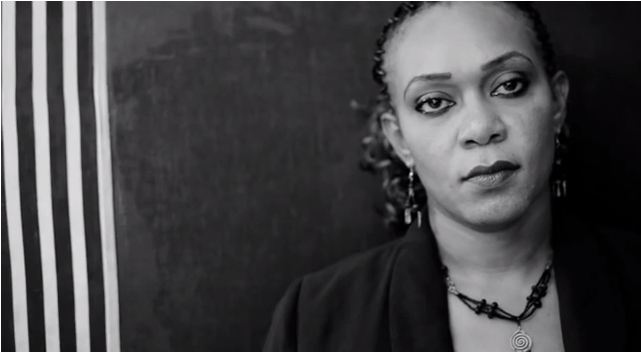
Amira Osman (Image: YouTube)
Amira Osman, a Sudanese engineer and women’s rights activist was last year arrested under the country’s draconian public order act, for refusing to pull up her headscarf. She was tried for “indecent conduct” under Article 152 of the Sudanese penal code, an offence potentially punishable by flogging. Osman used her case raise awareness around the problems of the public order law. She recorded a powerful video, calling on people to join her at the courthouse, and “put the Public Order Law on trial”. Her legal team has challenged the constitutionality of the law, and the trial as been postponed for the time being.
This case is not my own, it is a cause of all the Sudanese people who are being humiliated in their country, and their sisters, mothers, daughters, and colleagues are being flogged.
Fadiamata Walet Oumar — Mali
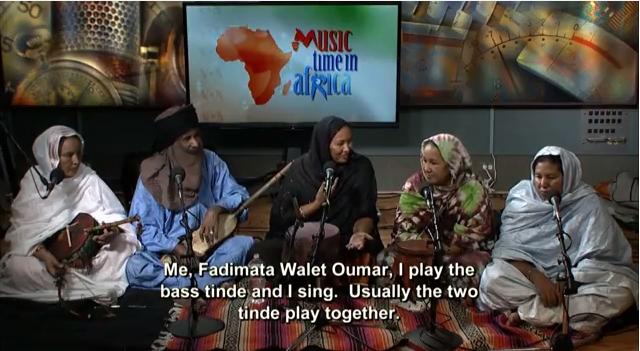
Fadiamata Walet Oumar with her band Tartit (Image: YouTube)
Fadiamata Walet Oumar is a Tuareg musician from Mali. She is the lead singer and founder of Tartit, the most famous band in the world performing traditional Tuareg music. The group work to preserve a culture threatened by the conflict and instability in northern Mali. Ansar Dine, an islamists rebel group, has imposed one of the most extreme interpretations of sharia law in the areas they control, including a music ban. Oumar believes this is because news and information is being disseminated through music. She fled to a refugee camp in Burkina Faso, where she has continued performing — taking care to hide her identity, so family in Mali would not be targeted over it. She also works with an organisation promoting women’s rights.
Music plays an important role in the life of Tuareg women. Our music gives women liberty…Freedom of expression is the most important thing in the world, and music is a part of freedom. If we don’t have freedom of expression, how can you genuinely have music?
Khadija Ismayilova — Azerbaijan

Khadija Ismayilova
Ismayilova is an award-winning Azerbaijani journalist, working with Radio Free Europe/Radio Liberty. She is know for her investigative reporting on corruption connected to the country’s president Ilham Aliyev. Azerbaijan has a notoriously poor record on human rights, including press freedom, and Ismayilova has been repeatedly targeted over her work. She was blackmailed with images of an intimate nature of her and her boyfriend, with the message to stop “behaving improperly”. This February, she was taken in for questioning by the general prosecutor several times, accused of handing over state secrets because she had met with visitors from the US Senate. In light of this, she posted a powerful message on her Facebook profile, pleading for international support in the event of he arrest.
WHEN MY CASE IS CONCERNED, if you can, please support by standing for freedom of speech and freedom of privacy in this country as loudly as possible. Otherwise, I rather prefer you not to act at all.
Jillian York — US
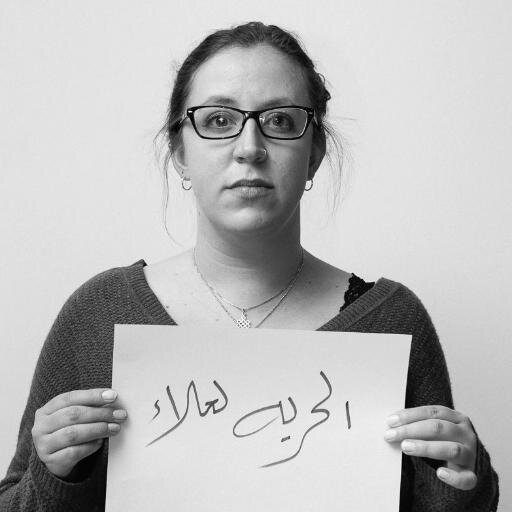
Jillian York (Image: Jillian C. York/Twitter)
Jillian York is a writer and activist, and Director of Freedom of Expression at the Electronic Frontier Foundation (EFF). She is a passionate advocate of freedom of expression in the digital age, and has spoken and written extensively on the topic. She is also a fierce critic of the mass surveillance undertaken by the NSA and other governments and government agencies. The EFF was one of the early organisers of The Day We Fight Back, a recent world-wide online campaign calling for new laws to curtail mass surveillance.
Dissent is an essential element to a free society and mass surveillance without due process — whether undertaken by the government of Bahrain, Russia, the US, or anywhere in between — threatens to stifle and smother that dissent, leaving in its wake a populace cowed by fear.
Cao Shunli — China
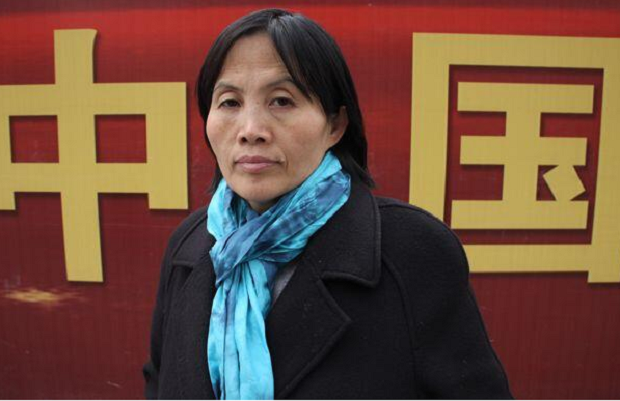
Cao Shunli (Image: Pablo M. Díez/Twitter)
Shunli is an human rights activist who has long campaigned for the right to increased citizens input into China’s Universal Periodic Review — the UN review of a country’s human rights record — and other human rights reports. Among other things, she took part in a two-month sit-in outside the Foreign Ministry. She has been targeted by authorities on a number of occasions over her activism, including being sent to a labour camp on at least two occasions. In September, she went missing after authorities stopped her from attending a human rights conference in Geneva. Only in October was she formally arrested, and charged for “picking quarrels and promoting troubles”. She has been detained ever since. The latest news is that she is seriously ill, and being denied medical treatment.
The SHRAP [State Human Rights Action Plan, released in 2012] hasn’t reached the UN standard to include vulnerable groups. The SHRAP also has avoided sensitive issue of human rights in China. It is actually to support the suppression of petitions, and to encourage corruption.
Zainab Al Khawaja — Bahrain
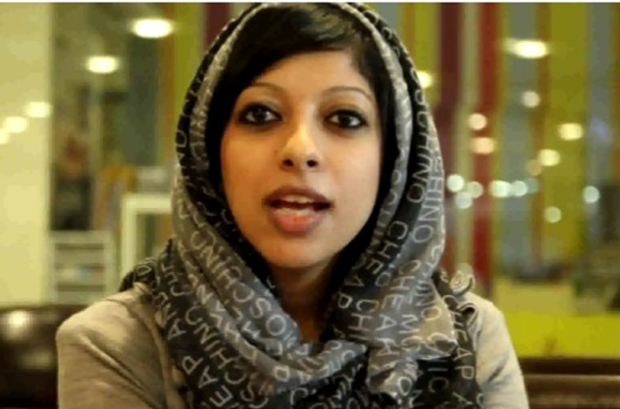
Zainab Al Khawaja
Al Khawaja is a Bahraini human rights activist, who is one of the leading figures in the Gulf kingdom’s ongoing pro-democracy movement. She has brought international attention to human rights abuses and repression by the ruling royal family, among other things, through her Twitter account. She has also taken part in a number of protests, once being shot at close range with tear gas. Al Khawaja has been detained several times over the last few years, over “crimes” like allegedly tearing up a photo of King Hamad bin Isa Al Khalifa. She had been in jail for nearly a year when she was released in February, but she still faces trials over charges like “insulting a police officer”. She is the daughter of prominent human rights defender Abdulhadi Al Khawaja, who is currently serving a life sentence.
Being a political prisoner in Bahrain, I try to find a way to fight from within the fortress of the enemy, as Mandela describes it. Not long after I was placed in a cell with fourteen people—two of whom are convicted murderers—I was handed the orange prison uniform. I knew I could not wear the uniform without having to swallow a little of my dignity. Refusing to wear the convicts’ clothes because I have not committed a crime, that was my small version of civil disobedience.
This article was posted on March 8, 2014 at indexoncensorship.org
24 Feb 2014 | Asia and Pacific, China, News
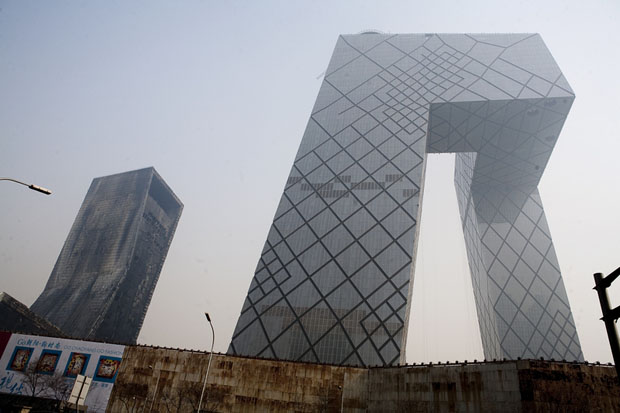
China’s state broadcaster CCTV fired a journalist for criticising its practise of airing live criminal “confessions” (Image: Matthew Niederhauser/Demotix)
In November 2013, Wang Qinglei, a TV producer at the state-broadcaster CCTV, left his office for the last time. “Long-time co-workers lamented with me, ‘Over all these years, there have been editors, reporters, producers, and directors who have been suspended because of stories, but you are the first producer who has been fired for speaking your true feelings! What is wrong with CCTV these days?'” he later wrote.
“In the space of a year, we get upwards of a thousand propaganda orders,” Wang had controversially vented on an internet forum prior to his dismissal. “We should ask ourselves: How many of these orders were issued in the national interest, and how many were issued to serve the political and economic interests of some individual, group or leader?”
His comments sparked alarm amongst the authorities. They had just passed laws forbidding citizens from exploiting the media to spread unfounded rumours and libellous claims, a strategy which most suspected was more covert censorship than genuine concern.
The open letter that he posted online, which CCTV would subsequently fire him over, focused on a new practice of airing live criminal “confessions.” State-owned CCTV had been broadcasting dramatised admissions by petty criminals for years, in an attempt to win new viewers, but in recent months, a string of high-profile political suspects had also been made to confess to crimes on air. The suspects are often filmed handcuffed and wearing jump suits. The footage is designed to be humiliating. The practice is ongoing.
Chinese-American Charles Xue, a social media celebrity and successful venture capitalist, had been amongst the first victims of the tactic, just two months previously. He “confessed” to having been “in a negative mood” while tweeting criticisms of the government, admitting that his thoughts were “a neglect of the social mainstream.” Separately, the authorities had arrested him for consorting with prostitutes, charges which some say are fabricated.
As Wang put it, when decrying the TV confessions in his open letter to CCTV executives: “We abused the public institution of media to wantonly bombard an individual indiscretion. Journalistic integrity and professionalism were nowhere to be found.”
The ironies of the circumstances surrounding Xue’s confession were either unintended or highly cynical. While the Chinese authorities are still having trouble taming the internet, the government remains in control of print and TV media.
Footage of Xue’s confession, for example, was widely discussed by Chinese TV and print outlets, whose freedom of expression is heavily limited by state involvement. Meanwhile, Xue’s online media presence was rapidly disappearing. Mentions of previous campaigns on microblogging site Weibo were removed. Wang’s open letter to CCTV, the one which had got him sacked, was also removed. Directives issued from the Ministry of Information detailed how links to any of the content would result in arrests.
Wang, and other critics of the policy, argued the on-air confessions, forced on high-profile enemies of the state such as Xue, were an unfair skip round a proper judicial process. Human rights lawyers and even some Communist Party officials have condemned the practice. The confessions sit alongside new legislation that forbids what the government call online “rumour mongering,” and allows anyone who retweets an “unfounded rumour” to be arrested. Thousands have now been arrested, including several high profile “social media celebrities.”
State newspapers say the new laws to control “rumour mongering” are necessary: “The Internet has grown into an easily accessible platform for the Chinese public, an increase in crimes such as defamation and blackmail has occurred online over the past few years.”
Indeed, authorities were quick to link Charles Xue’s arrest with those of Qin Zhihui and Yang Xiuyu – two so-called “black PR” professionals. Xue had allegedly invested in their controversial public relations outfit.
“Black PR” is a rapidly growing sector in China – which polishes the online reputation of celebrity and corporate clients – while spreading malicious rumours about their enemies. Rumours started by Qin and Yang were often fabricated, sometimes falsely accusing CEOs of infidelity, or involvements with prostitutes and causing a significant scandal when they effectively destroyed the Chinese Red Cross’ reputation, over made up allegations of sexual impropriety amongst senior officials at the organisation. The pair employed a 15,000 strong portfolio of online personalities to help spread their rumours – known as a “water army.”
Yet industrial smearing from the pair had gone unchecked for years — the government simply wasn’t interested in the malicious rumours Qin and Yang routinely disseminated. In fact, it was only when Qin and Yang’ decided to attack a senior Communist Party official, Lei Feng, that new “rumour mongering” legislation was suddenly used to arrest the pair. They now face long jail sentences.
Charles Xue, who was accused of backing the pair financially when he was arrested, has long been of interest to the party apparatus. As a young man, his father was imprisoned by Mao Zedong, and Xue was forcibly exiled to the countryside, put to work in attempt to reduce the threat he, and other academics, supposedly posed to communism. His outlook since the effective imprisonment has been increasingly international – as a young man he quickly learned English, did some translation work of American texts for publication in China, and travelled to Stanford to study.
In recent years, Xue has amassed not only vast wealth through his various business enterprises, but also several million followers on social media. He leverages this considerable audience for awareness campaigns around issues such as clean water, kidnapping and human rights. He also speaks passionately about the potential for Weibo to affect change.
The irony of the state abusing their control of TV and print to control those who “abuse” the media online has also been noted by local Chinese observers. Government bodies “spreading falsehoods” have come in for focussed criticism. Activists simply ask “why are men like Charles Xue being arrested, when the authorities regularly spread false rumours themselves?”
For example, an article about the Beijing police in a state-run newspaper, which reported on a supposed new crackdown on prostitution, was quickly identified as a fake. The article was in fact a repeat of an identical piece published several years earlier, which had simply been reprinted with a new date at the top.
Critics also called out newspaper Xinhua, when they mistakenly announced that Istanbul had been awarded the 2020 Olympic Games, instead of Japan. The authorities, who effectively operate Xinhua, were extremely embarrassed by the editorial hiccup. Yet no arrests at Xinhua have yet been made, over this Olympic-sized mistake.
International media has been suggesting Weibo is being”neutered” as a result of the new anti-rumours crackdown – with people too scared to use it. But newer analysis of online conversations since the legislation has been passed has revealed something strange. Record numbers of Chinese netizens are now politically active, in particular chatting about the relatively obscure political ideology “constitutionalism.” Constitutionalism is a reformist movement that advocates tying the Communist Party to a constitutional framework. In Weibo terms, the volume of conversations is enormous: there are currently twice as many microblogs referring to “constitutionalism” as were being made around the time of the Jade Rabbit moon landing. The Chinese foray into space held the previous record for most microblogs on a single topic, the analysis showed.
But on balance, the laws are chilling. The arrest net the “anti-rumours campaign” has thrown is big, with thousands already in custody. In politically troublesome Inner Mongolia, the state has made fifty arrests. And the firing of Wang Qinlei at CCTV will shake employees at state-owned media outlets, but also “social media celebrities” who are contemplating effecting social change online. The sacking starkly shows how the Communist Party stands behind CCTV as a broadcaster: endorsing public confessions to made-up crimes, as an agent of the state. Criticism of these public confessions will not be tolerated — instead it will be destroyed. And consider the “victim” of the confession, Charles Xue. Trumped up prostitution charges were probably difficult to explain to his wife. His kids won’t remember fondly, watching their dad on TV, confessing to being an enemy of the state. Nor the bullying that goes on in the school yard afterwards. The gossip and rumours behind his family’s back. “Saving face” is an all-important concept in China: public humiliation is the antithesis of that. Televised confessions, an unsettling and bizarre spectacle, are making even the most influential scared to speak out.
This article was posted on 21 February 2014 at indexoncensorship.org











